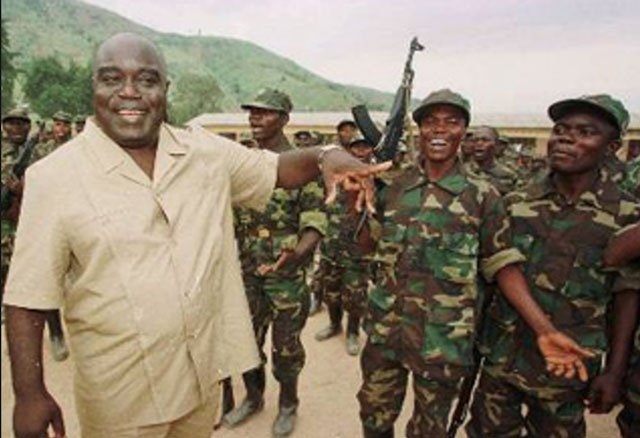
Kinshasa, DR Congo | AFP | Two decades after Kinshasa gave itself up willingly to rebel commander Laurent-Desire Kabila, his son Joseph remains at the helm of this vast, conflict-ravaged nation although his rule is mired in political crisis.
Back in 1997, the country then known as Zaire was struggling under the authoritarian rule of Joseph Mobutu Sese Seko, who seized power in 1965 and presided over a nepotistic regime steeped in corruption.
His rule came to an abrupt end in May that year when Kabila’s Alliance troops marched into the capital and the rebel chief declared himself president of the newly named Democratic Republic of Congo.
“They were very young, dirty, starving and collapsing under the weight of their weapons,” recalls Chantal Kikalulu of the forces who entered Kinshasa on May 17, a city exhausted by decades of dictatorship.
“Without thinking, we offered them food and drink.”
Backed by Uganda and Rwanda, Kabila’s Alliance of Democratic Forces for the Liberation of Congo (ADFL) had begun their rebellion just seven months earlier, staging a rapid takeover which saw Mobutu flee and the rebels welcomed with open arms.
“By dawn on May 17, 1997, excited residents of the city were running towards us with bread and water, and even buckets of water to wash ourselves with,” recalls Cedric ‘Zimbabwe’ Kabeya, who was just 16 when he served in Kabila’s army.
During the campaign, the ADFL — which had liberally recruited children and teenagers as soldiers — appeared to be far better disciplined than the rag-tag and generally unpaid Zairean Armed Forces (FAZ).
– ‘Had enough’ –
“Most of the cities fell into our hands without any resistance from Mobutu’s men who were demoralised and were just spewed out by the population,” recalls Major General Jean-Claude Kifwa, former head of Kabila’s guard.
The people were happy to cooperate because they had simply “had enough of being humiliated, plundered and gratuitously killed” by FAZ troops, says Kifwa, who is today in charge of defence for the southeastern part of the country.
There was even disillusionment with Mobutu at the highest levels within the army, he adds, saying the rebels had access to “strategic information” which came from the general staff.
According to a former senior FAZ officer, the last “real clashes with the enemy” took place at Kenge, 200 kilometres (120 miles) east of Kinshasa.
After Kenge fell, there was “no real reason to defend Kinshasa, which would have resulted in a bloodbath” in a metropolis which was home to several million people.
– ‘Liberators!’ –
By May 16, the ADFL was at the gates of the city and Mobutu fled to his hideout on the border with Central African Republic, dying in exile four months later.
General Donatien Mahele Lieko, who was chief of staff at the time, decided to surrender without a fight — for which he was quickly assassinated by Mobutu’s loyal presidential guards.
But history had already been written.
On May 17, ADFL forces entered Kinshasa alongside troops from Rwanda where they were welcomed by crowds hailing them as “liberators!” and shouting: “Kabila, we’re waiting for you!”
At the time, Kabila enjoyed a particularly favourable international context.
As well as the backing of Rwanda and Uganda, the rebel chief also had the support of Angola and Burundi which were determined oust Mobutu at a time when the dictator’s Western support had dried up following the end of the Cold War.
– ‘Total disillusionment’ –
But the enthusiasm over Kabila’s victory was short-lived — overtaken by the swift slide towards authoritarianism, subjugation of the opposition and the troublesome presence of Ugandan and Rwandan soldiers on the streets.
“It was total disillusionment,” admits Adolphe Muzito, who served as prime minister under Joseph Kabila, the current president, from 2008 to 2012.
“The people quickly understood that Laurent-Desire Kabila had been brought to power by Rwandan tanks and that it was time to free him from these foreigners whose leading role was clear.”
The rapid change in sentiment was also registered by the troops.
“Those who had welcomed us like princes suddenly became hostile, accusing us of being Rwandan,” says Zimbabwe, who ended his military career in 1999 and became an electrician.
They accused us of “acting as if we were in a country we’d just conquered,” recalls Armel Matabaro, another former child soldier.
“Our Rwandan commanders started looting property and mistreating people for no good reason, just like Mobutu’s soldiers.”
It was 14 months later when Kabila finally ordered Rwandan and Ugandan troops out of the country, triggering a violent conflict that quickly degenerated into the Second Congo War (1998-2003).
At the height of the war, which drew in at least six foreign armies and claimed hundreds of thousands of lives, Kabila was assassinated by a child soldier, and in January 2001 his 29-year-old son took over as president.
He was formally elected in 2006 in the country’s first free elections since independence in 1960, and has been in power ever since: His refusal to leave office after his term ended in December has sparked a new political crisis
 The Independent Uganda: You get the Truth we Pay the Price
The Independent Uganda: You get the Truth we Pay the Price




